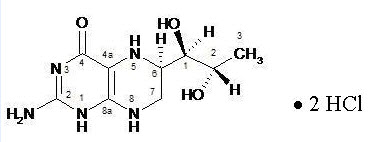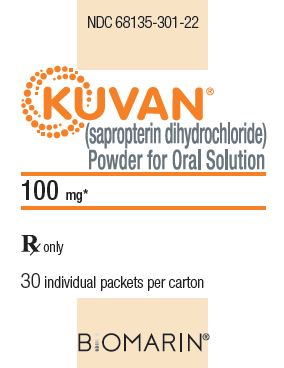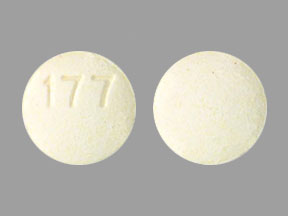Kuvan
Generic name: sapropterin
Drug class: Miscellaneous metabolic agents
Medically reviewed by A Ras MD.
What is Kuvan?
Kuvan is a prescription medicine used to lower blood levels of phenylalanine (Phe), in adults and children one month of age and older with a certain type of Phenylketonuria (PKU). Kuvan is used along with a Phe-restricted diet.
Description
Kuvan (sapropterin dihydrochloride) is an orally administered Phenylalanine Hydroxylase activator (or PAH activator). Sapropterin dihydrochloride, the active pharmaceutical ingredient in Kuvan, is a synthetic preparation of the dihydrochloride salt of naturally occurring tetrahydrobiopterin (BH4). Sapropterin dihydrochloride is an off-white to light yellow crystals or crystalline powder.
The chemical name of sapropterin dihydrochloride is (6R)-2-amino-6-[(1R,2S)-1,2-dihydroxypropyl]-5,6,7,8-tetrahydro-4(1H)-pteridinone dihydrochloride and the molecular formula is C9H15N5O3·2HCl with a molecular weight of 314.17.
Sapropterin dihydrochloride has the following structural formula:

Kuvan is supplied as tablets and powder for oral solution containing 100 mg of sapropterin dihydrochloride (equivalent to 76.8 mg of sapropterin base). Kuvan is also supplied as powder for oral solution containing 500 mg of sapropterin dihydrochloride (equivalent to 384 mg of sapropterin base).
Tablets are round, off-white to light yellow, mottled, and debossed with “177”. Each tablet contains the following inactive ingredients: ascorbic acid (USP), crospovidone (NF), dibasic calcium phosphate (USP), D-mannitol (USP), riboflavin (USP), and sodium stearyl fumarate (NF).
Kuvan powder for oral solution is off-white to yellow in color. Each unit dose packet contains the following inactive ingredients: ascorbic acid (USP), D-mannitol (USP), potassium citrate (USP), and sucralose (NF).
Mechanism of Action
Kuvan is a synthetic form of BH4, the cofactor for the enzyme phenylalanine hydroxylase (PAH). PAH hydroxylates Phe through an oxidative reaction to form tyrosine. In patients with PKU, PAH activity is absent or deficient. Treatment with BH4 can activate residual PAH enzyme activity, improve the normal oxidative metabolism of Phe, and decrease Phe levels in some patients.
What should I tell my healthcare provider before taking Kuvan?
Before you take Kuvan, tell your doctor about all your medical conditions, including if you:
- are allergic to sapropterin dihydrochloride or any of the ingredients in Kuvan. See the list of ingredients in Kuvan at the end of this guide.
- have poor nutrition or have loss of appetite.
- are pregnant or plan to become pregnant.
Pregnancy Exposure Registry: There is a pregnancy exposure registry for women who take Kuvan during pregnancy. The purpose of this registry is to collect information about the health of you and your baby. Talk to your doctor about how you can take part in this registry or contact the registry program at 1-800-983-4587. - are breastfeeding or plan to breastfeed. It is not known if Kuvan passes into your breast milk. Talk to your doctor about the best way to feed your baby if you take Kuvan.
Tell your doctor about all the medicines you take, including prescription and over-the-counter medicines, vitamins, herbal, and dietary supplements. Kuvan and other medicines may interact with each other.
Especially tell your doctor if you take:
- a medicine that contains levodopa
- an antifolate medicine
- sildenafil (Revatio, Viagra), tadalafil (Adcirca, Cialis), vardenafil (Staxyn, Levitra)
Tell your doctor if you are not sure if your medicine is one that is listed above.
Know the medicines you take. Keep a list of them to show your doctor and pharmacist when you get a new medicine.
How should I take Kuvan?
- Take Kuvan exactly as your doctor tells you. Your doctor should tell you how much Kuvan to take and when to take it.
- Your doctor may change your dose of Kuvan depending on how you respond to treatment.
- Take Kuvan 1 time each day with a meal. It is best to take Kuvan at the same time each day.
- Kuvan comes as a tablet and powder for oral solution.
- You can swallow Kuvan tablets whole or dissolve the tablets in water or apple juice. You may also crush the tablets and mix in a small amount of soft food, such as apple sauce or pudding before taking.
- Be sure that you know what dose of Kuvan powder your doctor prescribed and whether you should use Kuvan 100 mg packets, Kuvan 500 mg packets, or both types of packets to prepare your dose.
- Open Kuvan powder packets only when you are ready to use them.
- Kuvan powder for oral solution should be dissolved in water or apple juice. You may also mix the powder for oral solution in a small amount of soft food, such as apple sauce or pudding before taking.
- See the detailed “Instructions for Use” that comes with Kuvan for information about the correct way to dissolve and take a dose of Kuvan tablets or Kuvan powder for oral solution.
- It is not possible to know if Kuvan will work for you until you start taking Kuvan. Your doctor will check your blood Phe levels when you start taking Kuvan to see if the medicine is working.
- During treatment with Kuvan:
- Any change you make to your diet may affect your blood Phe level. Follow your doctor’s instructions carefully and do not make any changes to your dietary Phe intake without first talking with your doctor. Even if you take Kuvan, if your Phe blood levels are not well controlled, you can develop severe neurologic problems.
- Your doctor should continue to monitor your blood Phe levels often during your treatment with Kuvan, to make sure that your blood Phe levels are not too high or too low.
- If you have a fever, or if you are sick, your blood Phe level may go up. Tell your doctor as soon as possible so they can change your dose of Kuvan to help keep your blood Phe levels in the desired range.
- If you forget to take your dose of Kuvan, take it as soon as you remember that day. Do not take 2 doses in a day.
- If you take too much Kuvan, call your doctor for advice.
What are the possible side effects of Kuvan?
Kuvan can cause serious side effects, including:
- Severe allergic reactions. Stop taking Kuvan and get medical help right away if you develop any of these symptoms of a severe allergic reaction:
- wheezing or trouble breathing
- coughing
- feeling lightheaded or you faint
- flushing
- nausea
- rash
- Inflammation of the lining of the stomach (gastritis) or esophagus (esophagitis). Gastritis or esophagitis can happen with Kuvan and may be severe. Call your doctor right away if you have any of these signs or symptoms:
- Phe levels that are too low. Some children under the age of 7 years who take high doses of Kuvan each day may experience low Phe levels.
- Too much or constant activity (hyperactivity) can happen with Kuvan. Tell your doctor if you have any signs of hyperactivity, including:
- fidgeting or moving around too much
- talking too much
The most common side effects of Kuvan are:
- headache
- runny nose and nasal congestion
- sore throat
- diarrhea
- vomiting
- cough
Tell your doctor if you have any side effect that bothers you or that does not go away.
These are not all the possible side effects of Kuvan. For more information, ask your doctor or pharmacist. Call your doctor for medical advice about side effects. You may report side effects to FDA at 1-800-FDA-1088.
General information about the safe and effective use of Kuvan
Medicines are sometimes prescribed for purposes other than those listed in a Patient Information leaflet. Do not use Kuvan for a condition for which it was not prescribed. Do not give Kuvan to other people, even if they have the same symptoms you have. It may harm them. You can ask your pharmacist or doctor for information about Kuvan that is written for health professionals.
How should I store Kuvan?
- Store Kuvan at room temperature between 68°F to 77°F (20°C to 25°C).
- Keep Kuvan tablets in the original bottle with the cap closed tightly.
- Protect from moisture.
Keep Kuvan and all medicines out of the reach of children.
What are the ingredients in Kuvan?
Active ingredient: sapropterin dihydrochloride.
Kuvan tablet inactive ingredients: ascorbic acid, crospovidone, dibasic calcium phosphate, D‑mannitol, riboflavin, and sodium stearyl fumarate.
Kuvan powder for oral solution inactive ingredients: ascorbic acid, D‑mannitol, potassium citrate, and sucralose.
Label
100 MG POWDER FOR ORAL SOLUTION
- NDC 68135-301-22
- KUVAN®
- (sapropterin dihydrochloride)
- Powder for Oral Solution
- 100 mg*
- Rx only
- 30 individual packets per carton
- BIOMARIN®


SRC: NLM .
